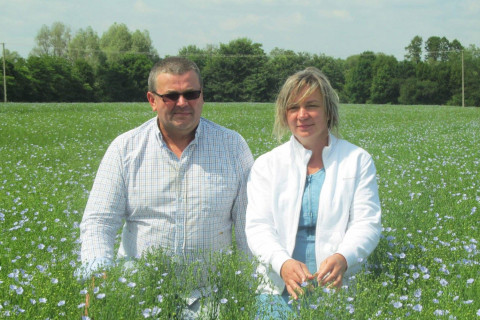
Innovative agricultural practices could have a positive impact on Europe’s environmental future and the adoption of these methods by sustainability-conscious farmers is becoming increasingly common.
One of these forward thinking farms is run by the Kowalski family of Nasieks, Poland. On their pig farm, they have used a combination of environmentally friendly methods to produce high-quality products whilst protecting our planet and the local environment.
As part of these efforts, they have planted over 1000 trees, which have created a buffer zone along the local river. Not only do they help the fight against greenhouse gas emissions by absorbing and sequestering carbon, they also protect the biodiversity of local watercourses by preventing nutrient run-off from the rest of the farm. This stops the growth of damaging algae blooms and helps maintain a varied selection of plant and animal life. Winter crops are also planted throughout the colder months and these contribute to the protection of local rivers and streams.
The installation of solar panels and a heat pump is helping the farm to reduce its greenhouse gas emissions. Not only does this have positive effects for the environment, but it has also had a positive economic impact, with an 80% decrease in the farm’s energy bills.
This combination of good environmental practices leading to clear economic benefits can also be seen in the rapeseed oil produced on the farm. Having decided to use only glass bottles rather than plastic when selling their produce, there has been marked increase in the quality of that oil.
However, one question remains - have these efforts had a beneficial effect on the local environment? If so, how do we measure them? Yet again, the Kowalski’s are up to the challenge – they have even found a way of testing the quality of their efforts using a method that also benefits the environment: bees.
By keeping 30 beehives on their land, the farmers can keep tabs on the environmental situation on the farm. Bees are extremely sensitive to environment disruption and the health of the beehives themselves act as an indicator as to the health of the environment around them. In exchange for these ‘bee friendly’ farming methods, the farm sees a financial bonus. The yield of rapeseed has increased up to 35% since the installation of an apiary and this has boosted the farm's profits by about €9400 per year.
Bees are not the only indicator of the farm’s environmental credentials; the number of earthworms found in the soil has also grown. The presence of so many worms is indicative of farming methods that are less destructive to the structure of the soil. Not only do they thrive in infertile soil worms also help to boost soil quality by breaking down any post-harvest residue into the accessible plant nutrients.
These methods are all indicative of a holistic approach to environmentally friendly farming and the Kowalski’s are keen to spread the news. They work with the regional agriculture advisory unit to promote best practice methods and have joined the national network of teaching farms. This hosts around 5500 visitors per year and helps to pass their experience on to other farmers, members of the public and hopefully, the next generation of European agriculture.